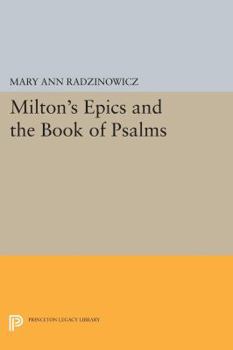Milton's Epics and the Book of Psalms
Select Format
Select Condition 
Book Overview
The Psalms were of intense interest to Milton, who read them not only as impassioned voices conveying significant moments in life's journey, but also as examples of various genres, each containing rhetorical and poetical conventions appropriate to the expressive intent of the speaker. In this book Mary Ann Radzinowicz describes the pervasive influence of these biblical works on Paradise Lost and Paradise Regained. She shows that the dramatic moments when Milton's characters respond to the numinous are shaped by his appreciation of the lyricism of the Psalms and by his studies of their thematic relationships.
This book traces the density of poetic voices in the epicsvoices arising from the echoing of psalm kindsand the ironic paralleling of important episodes in them. At the same time, Radzinowicz's book relates to each other Milton's two remarkable poetic oeuvres derived from the Old and New Testaments: one an anonymous, powerful, ancient, worship-centered, lyric work, the other an individually determined, revolutionary, heroic work. Originally published in 1989. The Princeton Legacy Library uses the latest print-on-demand technology to again make available previously out-of-print books from the distinguished backlist of Princeton University Press. These editions preserve the original texts of these important books while presenting them in durable paperback and hardcover editions. The goal of the Princeton Legacy Library is to vastly increase access to the rich scholarly heritage found in the thousands of books published by Princeton University Press since its founding in 1905.Format:Paperback
Language:English
ISBN:0691600570
ISBN13:9780691600574
Release Date:July 2014
Publisher:Princeton University Press
Length:246 Pages
Weight:0.77 lbs.
Dimensions:0.5" x 6.1" x 9.2"
Related Subjects
PoetryCustomer Reviews
0 rating





